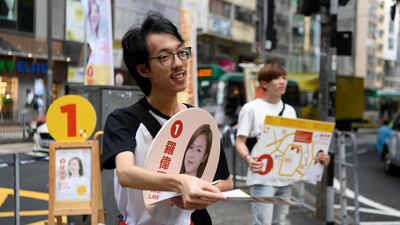Hong Kong’s District Council election on Sunday gives residents the first chance to express their political views through the ballot since the start of a protest movement that has plunged the Asian financial hub into its worst crisis in decades.
The council is Hong Kong's only political body to be elected directly. For the first time, all 452 seats on the council, currently held by the pro-establishment camp, are being contested. Additionally, a record 4.1 million of the territory’s 7 million residents have registered to vote, a quarter of whom are aged from 18 to 35.
Even though the District Council does not have a direct say in government policy-making like the Legislative Council, it selects 120 of the 1,200-member committee that elects the territory’s chief executive, giving councillors the potential to sway the selection of the head of government.
The outcome of the election is expected to indicate public opinion towards the unprecedented civil unrest that broke out in June this year in opposition to a law allowing extraditions from the Chinese special administrative territory to the mainland. The law has since been withdrawn but the protest movement’s demands have expanded to include greater democratic freedoms and an investigation into alleged police brutality against protesters.

The protests show no signs of ending and have become increasingly violent. In recent weeks young protesters have clashed with police after barricading themselves in at several universities. Most have dispersed but a few are still holding out the Hong Kong Polytechnic University.
"Hong Kong desperately needs a peaceful way for its citizens to express their political standings," Ed Chin, a campaign manager for a number of pro-democracy candidates, told The National.
Chief Executive Carrie Lam and a number of officials from Beijing have repeatedly said that a “silent majority” in Hong Kong are strongly opposed to the protests. The protesters, on the other hand, believe the entire city is standing with them.
"We need to settle this – I don't think I'll be able to get out to vote, but at least I hope people will go and exercise their rights and tell the government what the people really want," a 19-year-old protester at the Polytechnic University told The National.
That sentiment is behind the large number of democratic movement candidates standing for election.
“We are seizing this opportunity to make sure the democratic movement candidates take up the majority of the Council in order to send a strong message to the government, but also to influence the outcome of the selection process of the next chief executive,” Mr Chin said.
Authorities rejected the candidacy of the prominent pro-democracy activist Joshua Wong, on grounds that he allegedly promoted Hong Kong’s independence from China, but the movement has more than a few young and freshly minted politicians.
One of them is Willis Fong, 27, who is standing in the Yuen Long district.
"One of the reasons why I am running is because we have all seen how disconnected the government is to the reality," Mr Fong told The National.
“Carrie Lam seems to care more about broken glass at metro stations than protesters at hospital, and now it’s time to let her know that people always matter more.”
“There is also an increasing number of young candidates,” he said. “From my experience, I’d say a lot of them are running exactly because of what we have been through in the last six months.”
Mr Fong and Mr Chin are both confident that voters will favour the pro-democracy movement. There is precedent to give them hope. In 2003, when the District Council election was held a few months after approximately half a million people protested against proposed national security legislation, pro-democracy candidates enjoyed a sweeping win over their pro-establishment counterparts.
Even if pro-establishment candidates win the majority of seats this time, Mr Fong said, “our fight for freedom and democracy will never stop”.

